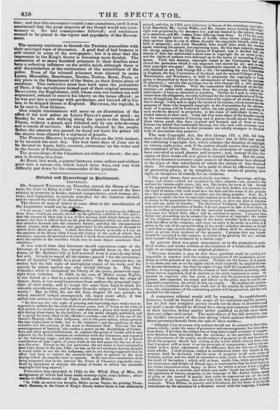The amnesty continues to furnish the Parisian journalists with their
principal topic: of discussion. A good deal of bad humour is still vented in some of the newspapers ; but it is clear that the impression in the King's favour is becoming more decided. The restoration of so many hundred prisoners to their families must
have a softening influence on the public mind, although there is still dissatisfaction at the continuance of the surveillance of the
police. None of the released prisoners were allowed to name Lyons, Marseilles, Bourdeaux, Nantes, Toulon, Brest, Paris, or any place in the Department of the Seine, as their future place of residence. This restriction must bear hard upon the journalists
of Paris, if the surveillance formed part of their original sentences. BEAUMONT, the Englishman, with whose case our readers are well acquainted, refused to receive his liberty on the terms offered ; so be was put into a carriage with gendarmes, and hurried off to Ca- lais, to be shipped thence to England. MEUNIER, the regicide, is to be sent to New Orleans.
One simple circumstance will serve as an illustration of the effect of the new policy on Louis PHILIP'S peace of mind : on Sunday he was seen walking along the quays to the Garden of Plants, without a guard, and followed only by one aide-de-camp and a couple of servants. He was loudly cheered by the people. Before the amnesty was passed, he dared not leave his palace till the streets were cleared by a regiment of guards. The Princess HELENA is expected in Paris on the 29th instant, to be married the next day. The first three days of June are to be devoted to feasts, balls, concerts, excursions on the water and in the forests of Fontainblcau.
The proceedings of the Chambers are without interest : the ses- sion is drawing to a close.
At Brest, last week, a quarrel between some sailors and soldiers grew into a serious riot, which lasted three days, and was with difficulty put down by the commander of the garrison.


























 Previous page
Previous page